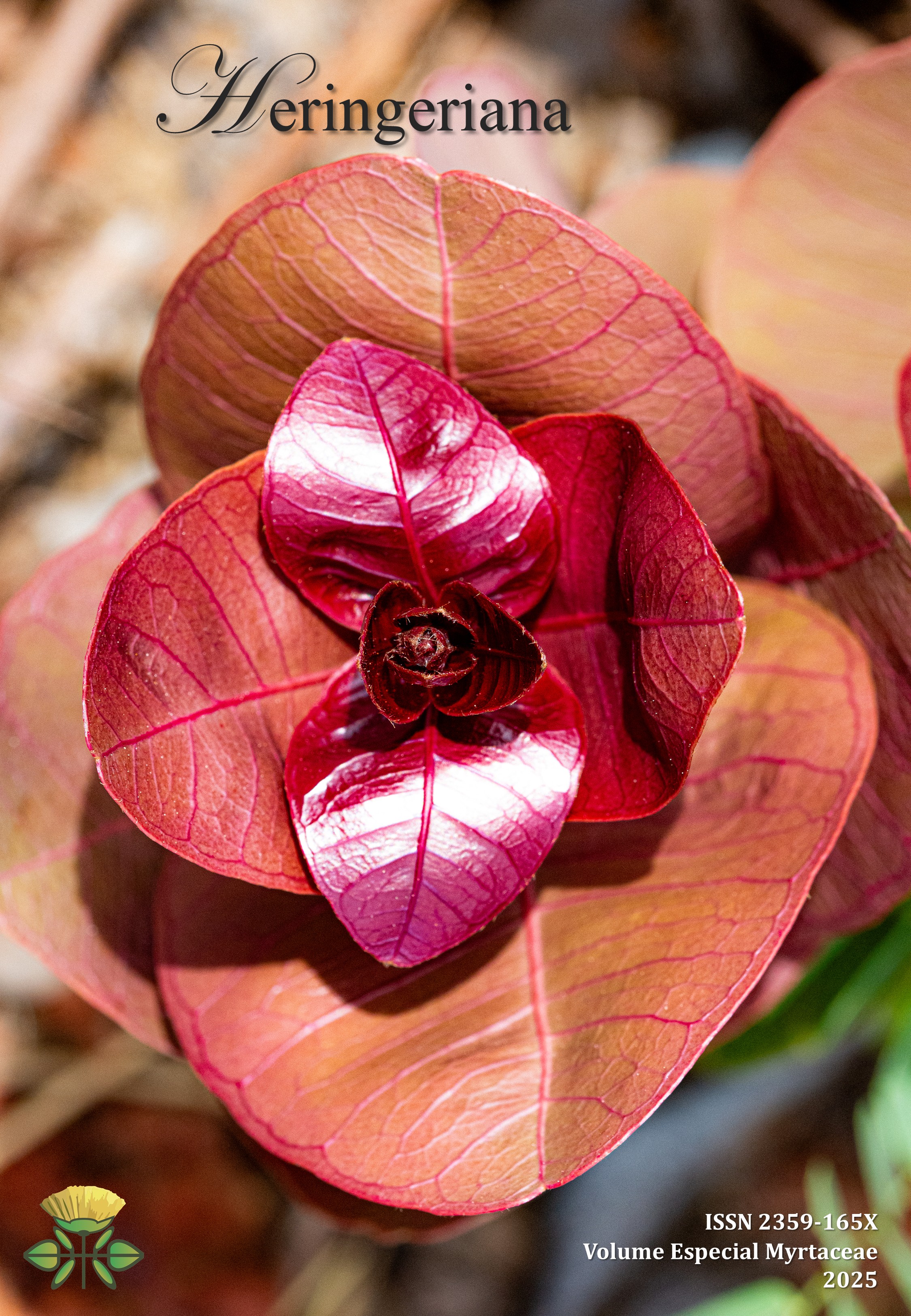Targeted DNA sequencing and morphology show that Psidium decussatum and P. salutare are distinct species
DOI:
https://doi.org/10.70782/heringeriana.v19ib.918067Palavras-chave:
high-throughput sequencing, Myrtaceae, phylogenomicsResumo
The Psidium salutare complex comprises a widely distributed group of two species, P. laruotteanum and P. salutare, the latter with five varieties. One of these varieties, Psidium salutare var. decussatum (basionym, P. decussatum) was used for a subgroup of P. salutare, here called “narrow-leaved salutare”. With better knowledge of the type of P. decussatum and modern collections, together with high-throughput sequencing and target enrichment with the Angiosperm 353 probe set, we compare Psidium decussatum to P. salutare (specifically the “narrow-leaved salutare” form) and other species of Psidium. Herbarium specimen analysis demonstrates that the names P. decussatum and P. salutare var. decussatum have often been erroneously applied to specimens of taxa other than P. decussatum or “narrow-leaved salutare”. Comparison of DNA of specimens of "narrow-leaved salutare” and the true P. decussatum confirm that these taxa are indeed distinct and for now, “narrow-leaved salutare” is considered an extreme morphotype of P. salutare. Here we re-circumscribe Psidium decussatum and present an identification key, along with images of relevant specimens.
Referências
Alain, H.L. (1973) Novitates Antillane VI (1). Phytologia, 25(5): 269.
Baker, W.J., Bailey, P., Barber, V. et al. (2022) A comprehensive phylogenomic platform for exploring the Angiosperm Tree of Life. Systematic Biology. 71: 301–319. https://doi.org/10.1093/sysbio/syab035
Berg, O. (1856) Revisio Myrtacearum Americae. Linnaea 27: 356–440.
Berg, O. (1857–1859) Myrtaceae. In: Martius KFP von(org.) Flora braziliensis. Monachii, Lipsae. Volume Fourteen, pars 1, pp. 390–615.
Burrett, M. (1941) Myrtaceenstudien II. Repert. Sp. Nov. 50: 484–485.
Cambessèdes, J. (1833) Myrtaceae. In: Saint-Hilaire, A., Jussieu, A. & Cambessèdes, J (eds.), Flora Brasiliae Meridionalis. Volume two. Apud A. Berlin, Bibliopolam, ViaDicta Des Mathuris S.-J., Parisiis. pp. 282–295.
Conceição, L.H.S.M. Filogenia e fitogeografia de Psidium L. (Myrtaceae: Myrteae) com base em sequenciamento de enriquecimento de alvos e análises de citometria de fluxo das seções de Psidium Apertiflora O.Berg e Mitranthes Tuler & Proença. Universidade de Brasília, Brasília, Tese de doutorado, dados não publicados.
De Candolle, A.P. (1828) Myrtaceae. In: De Candolle, A.P. (ed.) Prodromus Systematis Naturalis Regni Vegetabilis. Volume 3. Treuttel et Würtz, Paris. p. 235.
Doyle, J.J., Doyle, J.L. (1987) Isolation of plant DNA from fresh tissue. Focus 12: 13–15.
Chernomor O., von Haeseler, A. & Minh, B.Q. (2016) Terrace aware data structure for phylogenomic inference from supermatrices. Systematic Biology, 65(6), 997–1008. https://doi.org/10.1093/sysbio/syw037
Junier, T. & Zdobnov, E.M. (2010) The Newick utilities: high-throughput phylogenetic tree processing in the UNIX shell. Bioinformatics, 26(13), 1669–1670. https://doi.org/10.1093/bioinformatics/btq243
Johnson, M.G., Pokorny, L., Dodsworth, S., Botigué, L.R., Cowan, R.S., Devault, A., Eiserhardt, W. L. et al. (2019) A universal probe set for targeted sequencing of 353 nuclear genes from any flowering plant designed using k‐medoids clustering. Systematic Biology 68: 594–606. https://doi.org/10.1093/sysbio/syy086
Kiaerskou H. (1893) Enumeratio Myrtacearum Braziliensium quas collegerunt viri doctissimi Glaziou, Lund, Mendonça, Raben, Reinhardt,Schenck, Warming aliique. In: Warming E. (ed.) Symbolarum ad floram Braziliae centraliscognoscendam 39. Ex Officina Hoffensbergiana, Hauniae. 199 pp.
Kunth, K.S. (1823) Nova Genera et Species Plantarum. 6: 105.
Landrum, L.R. (2003) A revision of the Psidium salutare complex (Myrtaceae). Sida 20(4): 1449–1469.
Landrum, L.R. (2017) The Genus Psidium (Myrtaceae) in the State of Bahia, Brazil. Canotia 13: 1–101.
Landrum, L.R., Acosta Ramos, Z., Jiménez-Rodríguez, F. & Campbell, K.C.St.E. (2024) The Genus Psidium (Myrtaceae) in the Greater Antilles. Canotia 20: 1–55.
Lawrence, G.H.M. 1951. Taxonomy of Vascular Plants. 823 pp. New York: Macmillan
Mai, U. & Mirarab, S. (2018) TreeShrink: fast and accurate detection of outlier long branches in collections of phylogenetic trees. BMC Genomics, 19, 272. https://doi.org/10.1186/s12864-018-4620-2
Maurin, O., Anest, A., Bellot, S., Biffin, E., Brewer, G., Charles‐Dominique, T., Cowan, R.S., Dodsworth, S., Epitawalage, N. & Gallego, B. (2021) A nuclear phylogenomic study of the angiosperm order Myrtales, exploring the potential and limitations of the universal Angiosperms353 probe set. American Journal of Botany, 108(7), 1087–1111. https://doi.org/10.1002/ajb2.1699
Minh, B.Q., Schmidt, H.A., Chernomor, O., Schrempf, D., Woodhams, M.D., von Haeseler, A. & Lanfear, R. (2020) IQ-TREE 2: New models and efficient methods for phylogenetic inference in the genomic era. Molecular Biology and Evolution, 37(5), 1530–1534. https://doi.org/10.1093/molbev/msaa015
Mirarab, S. (2019) Species tree estimation using ASTRAL: practical considerations. arXiv: https://arxiv.org/abs/1904.03826v2 [Preprint].
Mirarab, S. & Warnow, T. (2015) ASTRAL-II: coalescent-based species tree estimation with many hundreds of taxa and thousands of genes. Bioinformatics, 31(12): i44–i52. https://doi.org/10.1093/bioinformatics/btv234
Percival-Alwyn, L., Barnes, I., Clark, M.D., Cockram, J., Coffey, M.P., Jones, S., Kersey, P.J., Kidner, C.A., Kosiol, C., Li, B., Marsh, W.A., Zhou, J., Caccamo, M., Milne, I. (2024). UKCropDiversity‐HPC: A collaborative high-performance computing resource approach for sustainable agriculture and biodiversity conservation. Plants, People, Planet. DOI: 10.1002/ppp3.10607
Proença, C.E.B., Tuler, A.C., Lucas, E.J., Vasconcelos, T.N.C., Faria, J.E.Q., Staggemeier, V.G., De-Carvalho, P.S., Forni-Martins, E.R., Inglis, P.W., da Mata, L.R., and da Costa, I.R. (2022) Diversity, phylogeny and evolution of the rapidly evolving genus Psidium L. (Myrtaceae, Myrteae). Annals of Botany 20: 1–22. https://doi.org/10.1093/aob/mcac005
POWO (2024) Plants of the World Online. Facilitated by the Royal Botanic Gardens, Kew. Available at: https://powo.science.kew.org/ Accessed: 15 December 2024.
Reflora (2024) Available at: https://reflora.jbrj.gov.br/reflora/herbarioVirtual/ Accessed on 13 December 2024
Salywon, A. (2007) Four new combinations in Mosiera (Myrtaceae) from the Caribbean. Journal of the Botanical Research Institute of Texas, 1: 899.
Sayyari E & Mirarab S. (2018) Testing for polytomies in phylogenetic species trees using quartet frequencies. Genes, 9(3), 132. https://doi.org/10.3390/genes9030132
SpeciesLink (2024) Available at: https://specieslink.net/ Accessed on: 13 December 2024.
Sprengel, K.P. (1825) Systema vegetabilium. 2: 471–488.
Stearn, W.T. 1983. Botanical Latin: history, grammar, syntax, terminology, and vocabulary. 3rd ed., rev. Newton Abbot: David & Charles
Downloads
Publicado
Como Citar
Edição
Seção
Licença
Copyright (c) 2025 Lázaro Henrique Soares de Moraes Conceição, Amélia Carlos Tuler, Eve J. Lucas, Alice Merrall, Olivier Maurin, Leslie R. Landrum

Este trabalho está licenciado sob uma licença Creative Commons Attribution 4.0 International License.
Ao fazer a submissão, os autores declaram não ter submetido o trabalho a outra revista e concordam em ter seu artigo publicado sob Licença Creative Commons Atribuição 4.0 Internacional BY (CC BY 4.0), que significa que os autores mantêm a propriedade dos direitos autorais, mas qualquer pessoa pode usar o conteúdo publicado, desde que os autores originais e a fonte sejam citados. O conteúdo científico, ortográfico e gramatical é de total responsabilidade dos autores.








